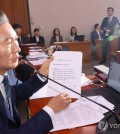- California Assembly OKs highest minimum wage in nation
- S. Korea unveils first graphic cigarette warnings
- US joins with South Korea, Japan in bid to deter North Korea
- LPGA golfer Chun In-gee finally back in action
- S. Korea won’t be top seed in final World Cup qualification round
- US men’s soccer misses 2nd straight Olympics
- US back on track in qualifying with 4-0 win over Guatemala
- High-intensity workout injuries spawn cottage industry
- CDC expands range of Zika mosquitoes into parts of Northeast
- Who knew? ‘The Walking Dead’ is helping families connect
Arrest warrant sought for Qoo10 CEO over massive payment delays
Prosecutors on Friday requested an arrest warrant for Ku Young-bae, CEO of Singapore-based Qoo10, which owns Korean online shopping platforms TMON and WeMakePrice, for alleged fraud, embezzlement and breach of duty over large-scale e-commerce insolvency incidents.
The Seoul Central District Prosecutors Office also sought warrants to arrest TMON CEO Ryu Kwang-jin and WeMakePrice CEO Ryu Hwa-hyun.
The prosecution said it filed for the warrants for them considering the significance of the incident, and the risk of them destroying evidence and fleeing.
In late July, TMON and WeMakePrice filed for corporate rehabilitation with the Seoul Bankruptcy Court after failing to make payments to vendors using their platforms since early July.
The payment delays by the two platforms prompted local financial authorities to launch an investigation. The authorities estimated there are more than 1.5 trillion won (US$1.1 billion) of unpaid bills and other liquidity issues regarding the incident.
Prosecutors estimated the amount of suspected fraud and embezzlement at 1.4 trillion won and 50 billion won, respectively. They also suspect that Qoo10 may have misused about 50 billion won of the shopping platforms’ due payments to vendors to acquire U.S. online e-commerce platform Wish.
Prosecutors recently questioned Ku over whether he arbitrarily used the affiliated companies’ funds and was involved in their irregular business operations despite knowing their financial situations were worsening.












